Hundreds of new laws go into effect Friday in Texas. Here are a few you should know
- Oops!Something went wrong.Please try again later.
Much of the legislation Texas lawmakers passed in the 88th Legislature is set to become law Friday.
Of the 774 bills that will go into effect, the new laws reach across all areas of Texans' daily life, affecting everything from taxes and registration fees to hospital visits and trips to the voting booth.
Here's a breakdown of a few of the bills.
Fentanyl poisoning
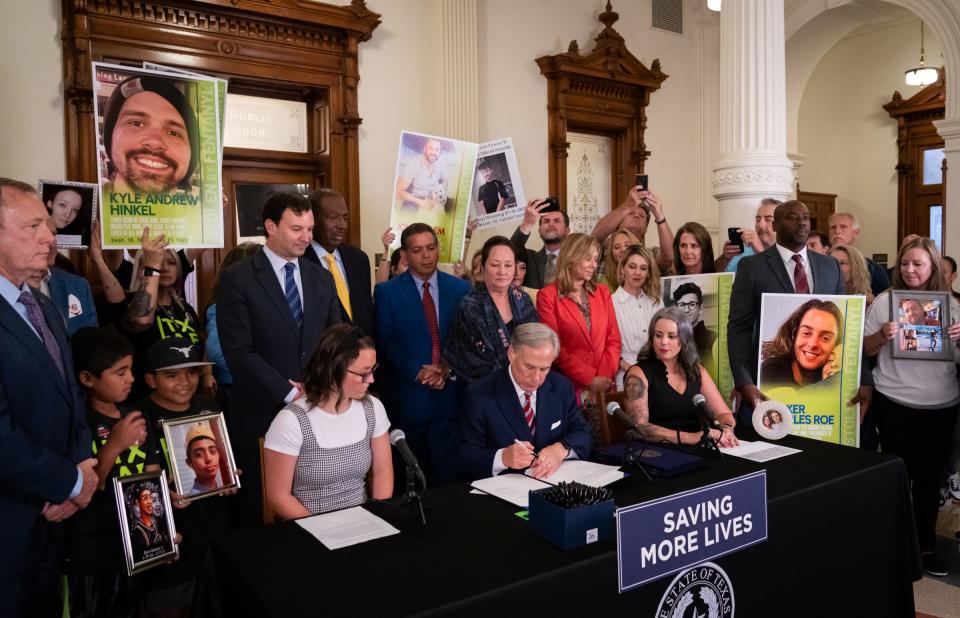
Lawmakers passed House Bill 6 to increase penalties for fentanyl related deaths, creating a second-degree felony for manufacturing or delivering fentanyl that results in an overdose.
Anyone charged with manufacturing, delivering or possessing between 200 to 400 grams of fentanyl with intent to deliver will face a first-degree felony, which comes with a minimum 10-year sentence and up to life in prison and a fine up to $100,000. For anyone caught with more than 400 grams, they could face a 15-year minimum jail term and a fine up to $250,000.
More: Is Narcan nasal spray enough? Some say shot needed to fight fentanyl overdoses in Austin.
The Republican-led effort to pass HB 6, which addresses a rise in fentanyl deaths, requires that death certificates include the phrase "fentanyl poisoning" or "fentanyl toxicity" if the substance is discovered in a toxicology analysis.
"This law makes clear that any person who causes a death by unlawfully manufacturing or delivering fentanyl can be prosecuted for murder in the state of Texas," Gov. Greg Abbott said in June at a bill signing ceremony alongside advocates for harsher penalties for fentanyl use and distribution.
'Rogue' prosecutors
Republicans in the Legislature passed House Bill 17 to challenge district and county attorneys who they call "rogue" and accuse of letting politics influence their decisions rather than fulfilling their oath to uphold the state's laws.
The measure had been designated a priority at the outset of the legislative session by Abbott as well as by Lt. Gov. Dan Patrick, who heads the Senate, and House Speaker Dade Phelan.
GOP scrutiny on prosecutors gained momentum last summer when five Texas district attorneys pledged in a statement that their offices would not prosecute abortion-related crimes after the U.S. Supreme Court overturned Roe v. Wade, the landmark case that guaranteed a person's right to an abortion.
Other prosecutors had said they won't prosecute theft cases when the goods stolen are under a certain dollar amount, or election fraud.
Under HB 17, an elected prosecutor could face a removal trial for official misconduct after a resident in their county files a complaint.
CROWN Act
The CROWN Act, which stands for Creating a Respectful and Open World for Natural Hair, passed with bipartisan support to prevent discrimination related to hair textures and protective styles such as braids, locs, twists and knots.
House Bill 567 prohibits discrimination in schools, workplaces and housing based on certain hair textures or protective hairstyles historically and culturally associated with race.
More: Texas House approves CROWN Act, sets protections against race-based hair discrimination
Under the new law, any dress or grooming policy implemented by a school district, including extracurricular activities, "may not discriminate against a hair texture or protective hairstyle commonly or historically associated with race," the bill reads.
Books and school safety
House Bill 900 mandates that book vendors that sell library materials to school districts create a rating system for books that are "sexually relevant" or "sexually explicit."
Under the bill by Rep. Jared Patterson, R-Frisco, districts will be prohibited from buying books from vendors that don’t follow the ratings. The law bans sexually explicit materials from school libraries and requires parental consent before a student may check out sexually relevant materials.
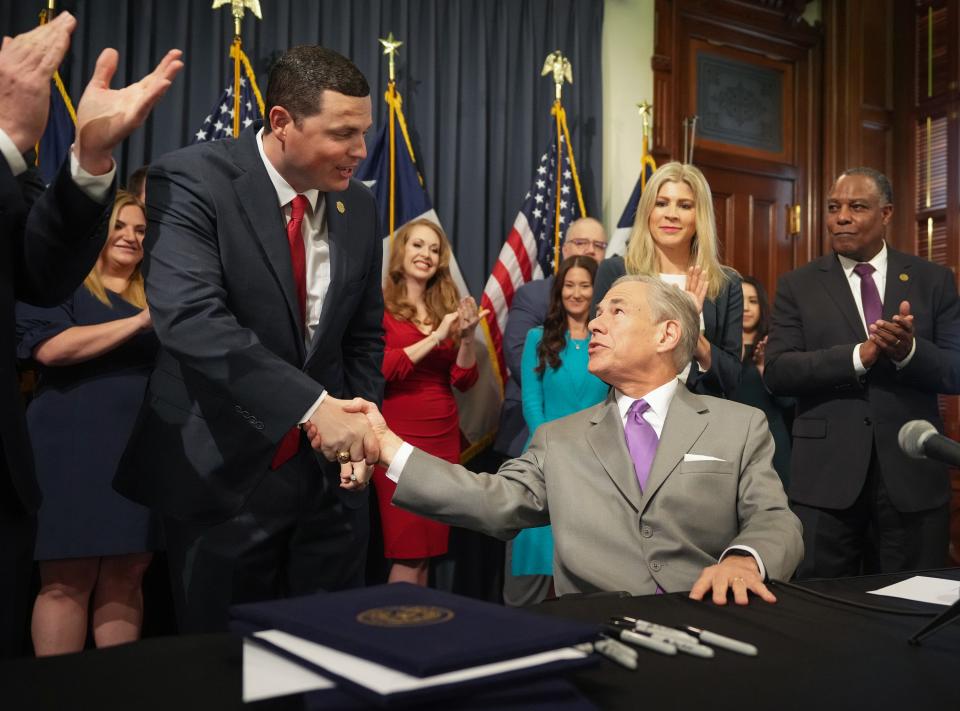
On Monday, an U.S. district judge heard arguments from lawyers for several Texas book sellers — including Austin’s BookPeople and Houston-based Blue Willow Bookshop — who have asked for a legal pause to the new law's start while its constitutionality is decided in court.
Outside of books, major legislation tied to schools came through House Bill 3, which seeks to address and boost school safety.
The bipartisan legislation spends nearly $330 million over the next two years to bolster school security infrastructure and increase school safety resources for campuses across Texas.
Illegal voting is again a felony
After lowering the penalty for illegally voting in Texas to a misdemeanor in 2021, lawmakers returned to the Capitol this year and approved House Bill 1243, which reinstates the charge's previous penalty of a second-degree felony.
While opponents of the bill painted the measure as an act of voter suppression, advocates said the legislation is simply a return to the previous long-standing penalty.
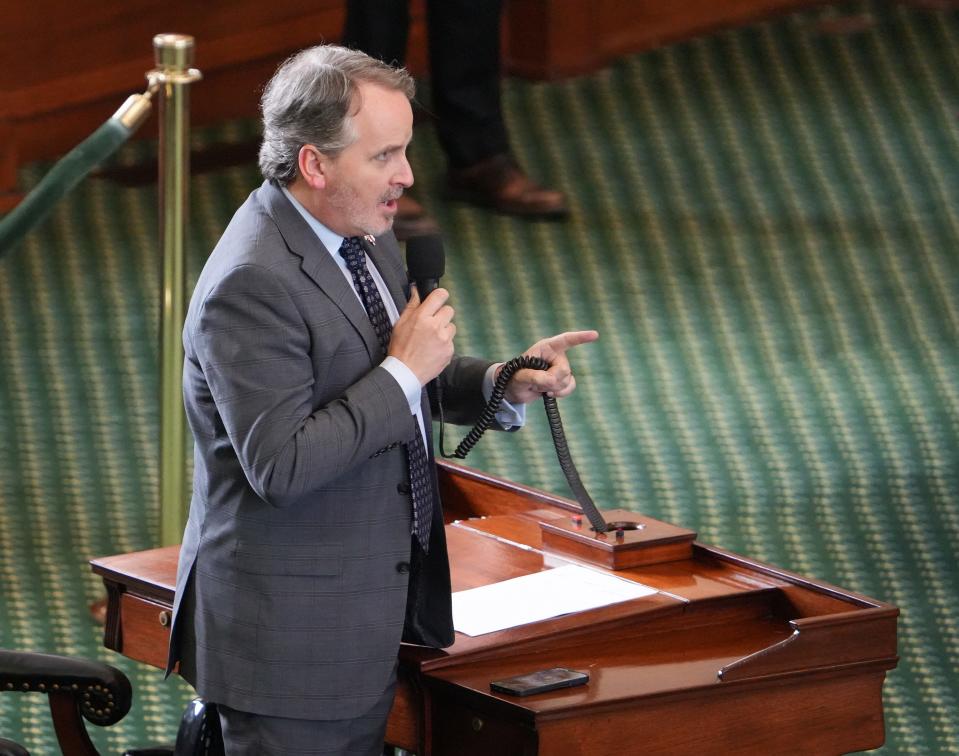
"We wouldn't want to give folks the impression that we're making some radical change in the law," said Sen. Bryan Hughes, R-Mineola, a leader on the issue in the past two sessions, during legislative debate earlier this year. "We're restoring the law to where it was two years ago, I think that's important."
While many other election related issues failed during the session, one election law going into effect Friday will disband the Harris County elections office and place the responsibility of handling elections in the state's largest county to the county's tax assessor-collector.
Border landowner compensation
As border issues continued to come up throughout the 140-day legislative session, Senate Bill 1133, which compensates property owners with up to $75,000 for damage on agricultural land, quietly passed with broad support in the House and Senate.
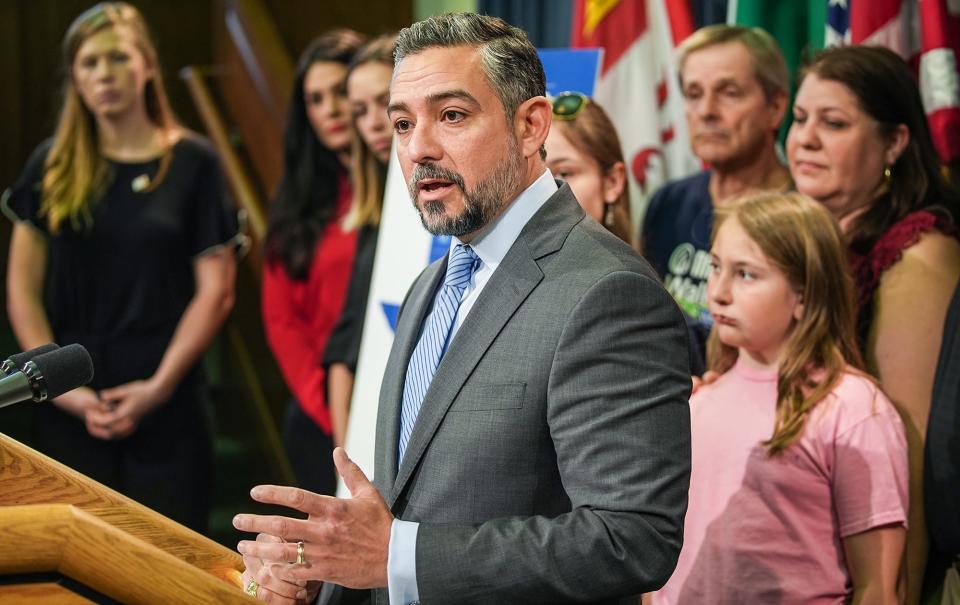
SB 1133 by Sen. César Blanco, D-El Paso, establishes a landowner compensation program that allows for a maximum $75,000 payment for property damage tied to trespassing or other crimes along the Mexico-Texas border.
Rules and eligibility requirements for the compensation program will be developed by the attorney general's office.
LGBTQ bills in court
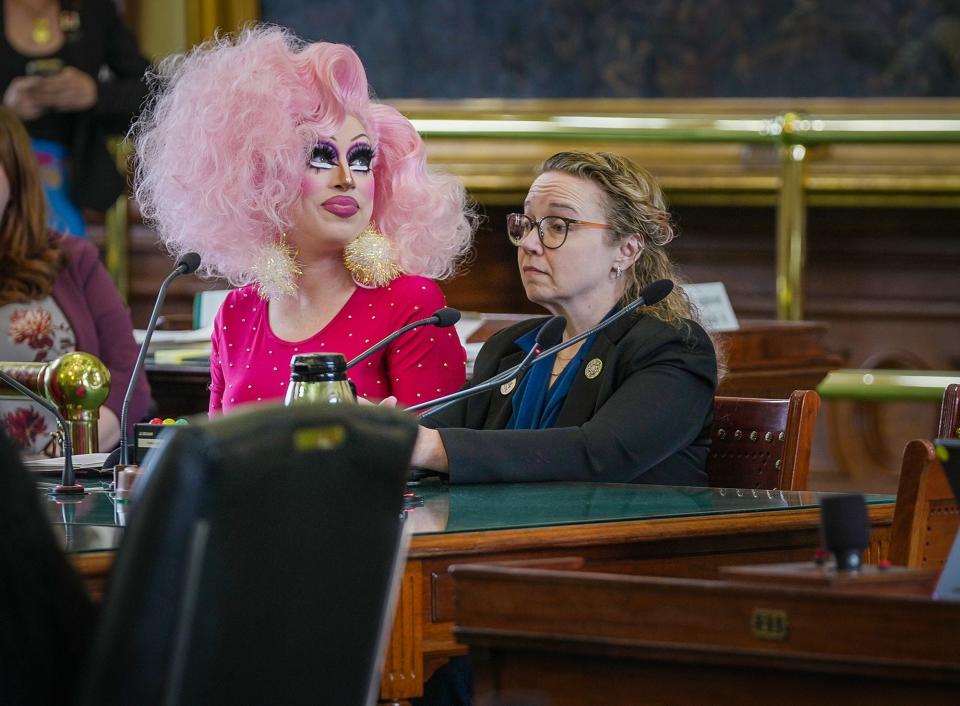
A ban on gender affirming care for minors is set to go into effect Friday despite an ongoing legal challenge.
Last week, an Austin-based judge ruled in favor of a temporary injunction for Senate Bill 14, which prohibits doctors from providing certain gender-affirming medical treatments — including puberty blockers, hormone therapy and certain surgeries — to minors experiencing gender dysmorphia, a condition in which a person’s gender identity doesn’t match the person’s sex at birth. The attorney general's office, however, successfully appealed that ruling to the Texas Supreme Court and the law is back on track for a Friday start.
SB 14 would also revoke the medical licenses of physicians who provide such care, and bans health care providers, hospitals and other entities that offer those medical treatments from receiving any public money.
More: Families, rights groups sue Texas over ban on gender-affirming care for transgender minors
In an effort to regulate "sexually oriented performances," Senate Bill 12 restricts those performances from taking place on commercial or public property or in the presence of minors.
Conduct deemed unacceptable under the new law, which Gov. Greg Abbott signed in June, includes exhibitions of sex acts, sexual arousal or any device designed specifically for sexual stimulation.
A lawsuit filed earlier this month by the ACLU of Texas in a U.S. district court in Houston argues that vague parameters in the new law violate both the First and Fourteenth Amendments, creating a prior restraint on free expression and an avenue for prosecutors to censor constitutionally protected activities.
More: Keep Austin Queer'd: Austin Pride carries on despite stifling heat and contention
In response to SB 12, which passed in the waning days of the legislative session in May after months of edits, protests and heated floor debates, a coalition of LGBTQ+ advocates and organizations are seeking an injunction in hopes of having the law found unconstitutional.
The case filed in Houston is ongoing, with a ruling possibly coming soon as the bill is set to go into effect Friday.
No more diaper, feminine hygiene taxes
Under Senate Bill 379, diapers, baby wipes and feminine hygiene products will be exempt from state sales tax.
“Families who are struggling to afford diapers and other necessities each month will see relief every time they go to the store. This law is a major step toward a healthier Texas,” said Holly McDaniel, executive director of the Austin Diaper Bank.

The tax exemption comes alongside medicaid benefits for new mothers, who will be eligible for one year of health insurance after the birth of a child.
Electric car registration
For those looking to buy and register a new electric vehicle in Texas, the price to do so will go up Friday.
Registering a new electric car will cost $400 after Senate Bill 505 passed both legislative chambers unanimously earlier this year, creating a distinction between electric and standard vehicles. Additionally, the legislation creates a new $200 annual registration renewal fee for electric cars, with that revenue directed to the state highway fund. Standard cars and light trucks pay an annual fee of $50.75.
Ban on COVID-19 restrictions
A priority item for Patrick, the lieutenant governor, Senate Bill 29 will prohibit governmental entities in Texas from implementing or enforcing a vaccine mandate, mask mandate or private business or school closures in an effort to prevent the spread of COVID-19.
This article originally appeared on Austin American-Statesman: New Texas laws go into effect Sept. 1 impacting LGBTQ+ people and more

